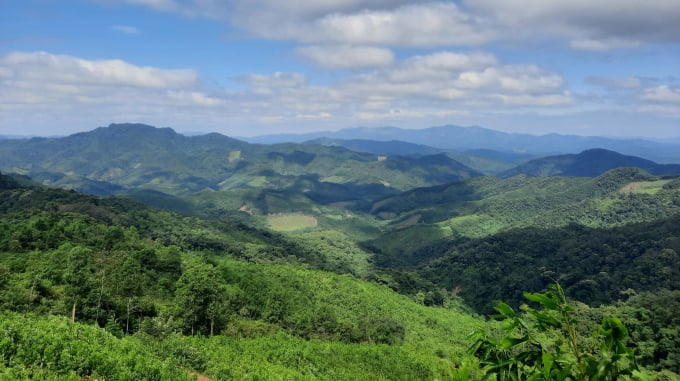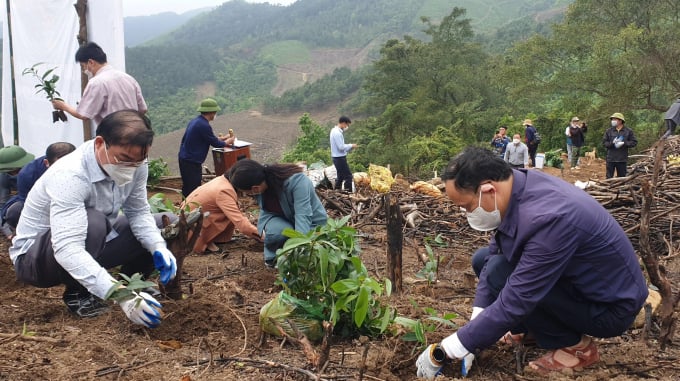May 19, 2025 | 13:28 GMT +7
May 19, 2025 | 13:28 GMT +7
Hotline: 0913.378.918
May 19, 2025 | 13:28 GMT +7
Hotline: 0913.378.918
After more than one year of implementation, Resolution No. 337 of the Quang Ninh province People's Council has step by step become effective and popular in many localities thereby, creating an important premise for forestry development turning it into a spearhead economic sector and contributing to the implementation of the province's "green" growth target.
Ha Long city is one of the localities with the largest forest area in the province including 150,000ha of production forest. It has very suitable soil conditions for growing large timbers which has been accelerated as soon as Resolution No. 337/2021/NQ-HDND was issued. Authorities in communes and wards have actively mobilized people to register for large timber plantations.
By the end of 2021, in Ha Long City, 144ha of large timber forests had been planted, with the participation of 64 households under total funding support for seeds, fertilizers, and materials worth VND1.5 billion following the Resolution No. 337.

Large timber forests in Ha Long city (Quang Ninh) are being replicated. Photo: Nguyen Thanh.
In 2022, some 113 households have registered to participate in large timber plantations on a converted area of 238ha. The Ha Long city People's Committee has also approved a planting plan for a total area of more than 335ha in 10 communes and wards attracting the participation of 159 forest owners, households, and individuals.
Ba Che district has stepped up the dissemination of forestry policies, guided forest owners to register for participation, and set plans for the production and development of large timber forests and native plants.
In 2021, Ba Che supported 170 households in developing large timber and indigenous tree plantations on an area of 279.8ha with a total support budget of over VND3.5 billion. In which, 47 households had borrowed funds of more than VND1.9 billion disbursed and entrusted through banks for social policy at the district level. In 2022, communes and towns in the district will also implement a plan to support forestry development for 462 households on a total area of over 900ha.
The total funding proposed to support forest planting has reached over VND11 billion. In addition, the People's Committee of Ba Che has approved 8 forest planting plans for 462 households on a total area of more than 900ha focusing on species of cinnamon, green ironwood, resinous pine, and grafted green cypress.
Large timber and perennial forests have been increasingly replicated thereby, contributing to the improvement of forest coverage, and ecological and sustainable natural environment protection at the same time creating a driving force for Quang Ninh to develop a green and sustainable economy.
Previously, Dai Duc commune (Tien Yen district) mainly focused on growing acacia trees, but in recent years, being mobilized by the commune authority, many households have boldly converted to growing cinnamon. The cinnamon growing cycle takes about 10 years (the harvest time is twice that of acacia) but the people of Dai Duc commune still decide to choose the plant because its economic value is 7-10 times higher than that of acacia trees. Up to now, the cinnamon cultivation area in the whole commune has reached nearly 700ha with the participation of more than 630 households making it the largest cinnamon growing area in the district.
Thanks to the right transformation, the cinnamon growing model has so far helped many households in the commune to have jobs, increase income, and develop forestry more and more sustainably.
Cinnamon products are all purchased by traders right after harvest. Thus, the economic value of the cinnamon growing model reaches VND600-700 million/ha. In the coming time, the commune will continue to mobilize households to expand the cinnamon growing area towards deep processing.

The concentrated afforestation area in Quang Ninh has so far reached more than 4,300ha. Photo: Nguyen Thanh.
As of May 13, the whole province has planted 849ha of large timber forest fulfilling 34% of the plan. Forest product processing establishments have been developing and expanding in terms of scale and capacity, gradually shifting from raw to fine processing, thus improving product quality and value. The area of concentrated afforestation in Quang Ninh has so far reached more than 4,300ha, equaling 34% of the plan (12,758ha).
Companies and cooperatives in the province have been proactively investing in sustainable forestry production, creating a driving force to increase the value of planted forests and improve economic efficiency in the locality.
According to Mr. Nguyen Minh Son, Director of the Department of Agriculture and Rural Development (DARD), Quang Ninh is gradually completing the goals of sustainable forestry development along with the value chain, encouraging investors in planting large timber forests and speeding up economic development towards a green industry and environmental pollution control. The province is focussing on building the forest product chain with high economic value, creating jobs, improving people's incomes and reducing the gap between rich and poor among localities.
The Quang Ninh DARD said by the end of April 2022, the registered afforestation area in the province had reached over 500ha. Some units have deployed forest plantations on large areas such as the Ban Sen forest production complex (Van Don district) 200ha; Ba Che Forestry One Member Company Limited with 50ha and Tien Yen Forestry One Member Limited Liability Company with 40ha…
Translated by Linh Nguyen

(VAN) 14 out of 35 domesticated elephants in Dak Lak province have had their living conditions improved, with 11 of them currently participating in the non-riding elephant tourism model.

(VAN) Muong Nhe Nature Reserve hopes that being upgraded to a national park will lay the foundation for forest protection efforts to be carried out in a systematic, modern, and sustainable manner.
/2025/05/16/3923-2-171845_52.jpg)
(VAN) Lower costs, higher yields, and improved soil quality are outstanding benefits that soybeans bring when integrated into the crop rotation system.

(VAN) The 'For a Green National Environment' programme aims to promote a green lifestyle, support businesses in implementing ESG practices, and turn Net Zero commitments into concrete actions.

(VAN) Cold-barn systems efficiently manage environmental and temperature conditions, which aids in the prevention of respiratory diseases in pigs and protects them from the vectors that transmit African swine fevers.

(VAN) To tackle challenges, the project 'Addressing key technical bottlenecks in the grouper supply chain in Vietnam' has been underway since 2024.

(VAN) The project 'Disease-Resilient and Sustainable Cassava Production Systems in the Mekong Region', funded by the Australian Center for International Agricultural Research (ACIAR), is being implemented from 2024 to 2028.